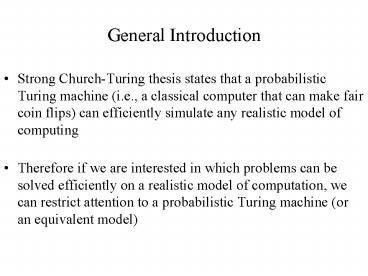General Introduction PowerPoint PPT Presentation
1 / 33
Title: General Introduction
1
General Introduction
- Strong Church-Turing thesis states that a
probabilistic Turing machine (i.e., a classical
computer that can make fair coin flips) can
efficiently simulate any realistic model of
computing - Therefore if we are interested in which problems
can be solved efficiently on a realistic model of
computation, we can restrict attention to a
probabilistic Turing machine (or an equivalent
model)
2
Physics and Computation
- Information is stored in a physical medium and
manipulated by physical processes - Therefore the laws of physics dictate the
capabilities and limitations of any information
processor - The classical laws of physics are (usually) a
good approximation to the laws of physics
3
Physics and Computation
- The theory of quantum physics is a much better
approximation to the laws of physics - The probabilistic Turing machine is implicitly a
classical device and it is not known in general
how to use it to simulate efficiently quantum
mechanical systems Fey82 - A computer designed to exploit the quantum
features of Nature (a quantum computer) seems to
violate the Strong Church-Turing thesis
4
Physics and Computation
- Is a quantum computer realistic? Answer seems to
be YES - If the quantum computers are a reasonable model
of computation, and classical devices cannot
efficiently simulate them, then the strong
Church-Turing thesis needs to be modified to
state that a quantum Turing machine can
efficiently simulate any realistic model of
computation
5
Quantum Communication and Cryptography
- By exploiting the quantum mechanical behavior of
the communication medium, we can detect
eavesdroppers (leading to quantum cryptography)
and solve distributed computation tasks more
efficiently. - Unfortunately, we wont be covering this in
depth in this course, but we will lay the
foundation for further reading in quantum
information theory.
6
Probability Amplitude and Measurement
If the photon is measured (with some external
apparatus) when it is in the state then we get
with probability
7
Quantum Operations
The operations are induced by the apparatus
linearly, that is, if and then
8
Quantum Operations
Any linear operation that takes
states satisfying and maps them to
states satisfying must be UNITARY
9
Linear Algebra
corresponds to
corresponds to
corresponds to
10
Linear Algebra
corresponds to
corresponds to
11
Linear Algebra
is unitary if and only if
12
More than one qubit
If we concatenate two qubits
we have a 2-qubit system with 4 basis states
and we can also describe the state as or by
the vector
13
More than one qubit
In general we can have arbitrary
superpositions
where there is no factorization into the tensor
product of two independent qubits. These states
are called entangled.
14
Measuring multi - qubit systems
If we measure both bits of we get with
probability
15
Overview
- Classical Logic Gates
- Reversible Logic
- Quantum Gates
- A taste of quantum algorithms
16
Classical Logic Gates
- A gate is a function from m bits to n bits, for
some fixed numbers m and n
AND
NOT
17
Classical Logic Gates
- We glue gates together to make circuits (or
arrays of gates) which compute Boolean functions
18
Classical Logic Gates
- If all physical processes are unitary (and thus
reversible), a complete description of a physical
process implementing the AND gate should be
reversible. - However the AND gate is not logically reversible.
- Therefore, the (non-reversible) AND gate throws
away or erases information that would make it
reversible.
19
Classical Logic Gates
- Landauers Principle To erase a single bit of
information dissipates at least kT log(2) amount
of energy into the environment - It was thought that dissipation of energy implied
fundamental limits on real computation
20
Classical Logic Gates
- However Bennett showed that any computation can
be made reversible and therefore doesnt in
principle require energy dissipation - Method Replace each irreversible gate with a
reversible generalization
21
Irreversible gates from reversible ones
- Note that irreversible gates are really just
reversible gates where we hardwire some inputs
and throw away some outputs
22
Some tensor product facts
23
Some tensor product facts
24
Information and Physics
- Information is always stored in a physical medium
and manipulated by a physical process. - Any meaningful theory of information processing
must refer (at least implicitly) to a realistic
physical theory.
25
Quantum Mechanics and Information Processing
- Since physics is quantum mechanical, we need to
recast the theory of information processing in a
quantum mechanical framework.
26
Implications
- How does this affect computational complexity?
- How does this affect communication complexity?
- How does this affect information security?
- Would you believe a quantum proof?
27
A small computer
(negligible coupling to the environment)
28
Information and Physics
(negligible coupling to the environment)
29
Is this realistic?
- We do have a theory of classical linear error
correction. - But before we worry about stabilizing this
system, lets push forward its capabilities.
30
Information and Physics
31
A quantum gate
?NOT
?NOT
32
???
What is supposed to mean?
33
One thing we know about it
If we measure
we get with probability and
with probability

